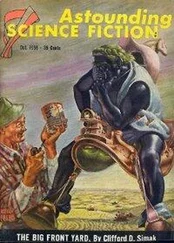And then someone hauled him out of there before he even had a drink with his pal.
XVI
He stumbled up the stairs and negotiated his way around the desk and plopped into the chair. Someone had fastened a steel bowl securely over the top half of his head and two men, or possibly three, were banging it with a hammer, and his mouth had a wool blanket wadded up in it, and he could have sworn that at any moment he’d drop dead of thirst.
He heard footsteps on the stairs and hoped that it was Bat Ears, for Bat Ears would know what to do.
But it was Spencer.
“How’re you feeling?” Spencer asked.
“Awful,” Warren groaned.
“You turned the trick!”
“That tower business?”
“You hooked up the wires,” said Spencer, “and the stuff is rolling out. Lang has a recorder hooked up and we’re taking turns listening in and the stuff we’re getting is enough to set your teeth on edge.”
“Stuff?”
“Certainly. The knowledge that mind trap has been collecting. It’ll take us years to sort out all the knowledge and try to correlate it. Some of it is just in snatches and some of it is fragmentary, but we’re getting lots of it in hunks.”
“Some of our own stuff being fed back to us?”
“A little. But mostly alien.”
“Anything on the engines?”
Spencer hesitated. “No, not on our engines. That is –”
“Well?”
“We got the dope on the junkyard engine. Pollard’s already at work. Mac and the boys are helping him get it assembled.”
“It’ll work?”
“Better than what we have. We’ll have to modify our tubes and make some other changes.”
“And you’re going to –”
Spencer nodded. “We’re ripping out our engines.”
Warren couldn’t help it. He couldn’t have helped it if he’d been paid a million dollars. He put his arms down on the desk and hid his face in them and shouted raucously with incoherent laughter.
After a time he looked up again and mopped at laughter-watered eyes.
“I fail to see –” Spencer began stiffly.
“Another junkyard,” Warren said. “Oh, God, another junkyard!”
“It’s not so funny, Warren. It’s brain-shaking – a mass of knowledge such as no one ever dreamed of. Knowledge that had been accumulating for years, maybe a thousand years. Ever since that other race came and emptied the trap and then went away again.”
“Look,” said Warren, “couldn’t we wait until we came across the knowledge of our engines? Surely it will come out soon. It went in, was fed in, whatever you want to call it, later than any of the rest of this stuff you are getting. If we’d just wait, we’d have the knowledge that we lost. We wouldn’t have to go to all the work of ripping out the engines and replacing them.”
Spencer shook his head. “Lang figured it out. There seems to be no order or sequence in the way we get the information. The chances are that we might have to wait for a long, long time. We have no way of knowing how long the information will keep pouring out. Lang thinks for maybe years. But there’s something else. We’ve got to get away as soon as possible.”
“What’s the matter with you, Spencer?”
“I don’t know.”
“You’re afraid of something. Something’s got you scared.”
Spencer bent over and grasped the desk edge with his hands, hanging on.
“Warren, it’s not only knowledge in that thing. We’re monitoring it and we know. There’s also –”
“I’ll take a guess,” said Warren. “There’s personality.”
He saw the stricken look on Spencer’s face.
“Quit monitoring it,” ordered Warren sharply. “Turn the whole thing off. Let’s get out of here.”
“We can’t. Don’t you understand? We can’t! There are certain points. We are –”
“Yes, I know,” said Warren. “You are men of science. Also downright fools.”
“But there are things coming out of that tower that –”
“Shut it off!”
“No,” said Spencer obstinately. “I can’t. I won’t.”
“I warn you,” Warrant said grimly, “if any of you turn alien, I’ll shoot you without hesitation.”
“Don’t be a fool,” Spencer turned sharply about and went out the door.
Warren sat, sober now, listening to Spencer’s feet go down the steps.
It was all very clear to Warren now.
Now he knew why there had been evidence of haste in that other ship’s departure, why supplies had been left behind and tools still lying where they had been dropped as the crew had fled.
After a while Bat Ears came up the stairs, lugging a huge pot of coffee and a couple of cups.
He set the cups down on the desk and filled them, then banged down the pot.
“Ira,” he said, “it was a black day when you gave up your drinking.”
“How is that?” asked Warren.
“Because there ain’t no one, nowhere, who can hang one on like you.”
They sat silently, gulping the hot, black coffee.
Then Bat Ears said, “I still don’t like it.”
“Neither do I,” admitted Warren.
“The cruise is only half over,” said Bat Ears.
“The cruise is completely over,” Warren told him bluntly. “When we lift out of here, we’re heading straight for Earth.”
They drank more coffee.
Warren asked: “How many on our side, Bat Ears?”
“There’s you and me,” said Bat Ears, “and Mac and the four engineers. That’s seven.”
“Eight,” corrected Warren. “Don’t forget Doc. He hasn’t been doing any monitoring.”
“Doc don’t count for nothing one way or the other.”
“In a pinch, he still can handle a gun.”
After Bat Ears had gone, Warren sat and listened to the sound of Mac’s crew ripping out the engines and he thought of the long way home. Then he got up and strapped on a gun and went out to see how things were shaping up.
Cliff referred to this story, before he ever sent it to a publisher, by the name of “Space Calls Mr. Meek,” and he was paid one hundred dollars for it by Planet Stories. It will remind you irresistibly of the stereotypical pulp Westerns of the sort he’d been writing during the preceding couple of years, the sort that had been a staple of American literature for several decades – complete with a saloon on an asteroid and gunfights – but it has so much humor that one has to call it satire. And something about it must have tickled Cliff, because he wrote a sequel before this one was even published and, perhaps, a third one – and with the exception of the City stories, he wasn’t a writer who did sequels.
And another familiar feature of many Simak stories from the thirties reappears: good old Martian bocca.
—dww
I
Now that he’d done it, Oliver Meek found the thing he’d done hard to explain.
Under the calm, inquiring eyes of Mr. Richard Belmont, president of Lunar Exports, Inc., he stammered a little before he could get started.
“For years,” he finally said, “I’ve been planning a trip …”
“But, Oliver,” said Belmont, “we would give you a leave of absence. You’ll be back. There’s no reason to resign.”
Oliver Meek shuffled his feet and looked uncomfortable, a little guilty.
“Maybe I won’t be back,” he declared. “You see, it isn’t just an ordinary trip. It may take a long, long time. Something might happen. I’m going out to see the Solar System.”
Belmont laughed lightly, reared back in his chair, matching fingertips. “Oh, yes. One of the tours. Nothing dangerous about them. Nothing at all. You needn’t worry about that. I went on one a couple of years ago. Mighty interesting. …”
Читать дальше












